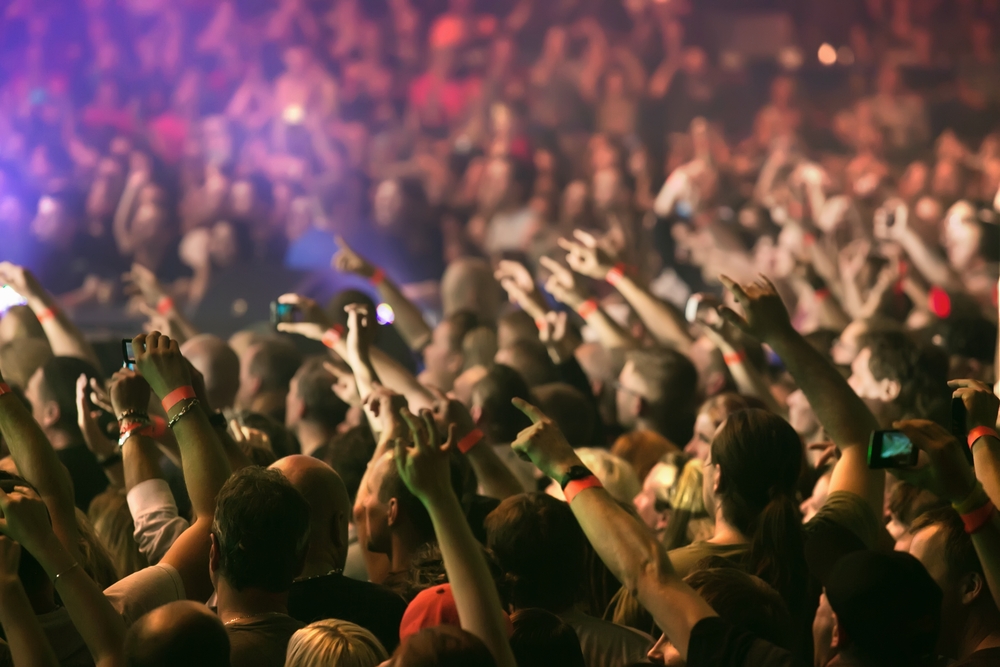Concert promotion matters.
While that might seem like an obvious things to say (especially coming from us), you can, at times, come across concert promoters who believe that the gig will “sell itself.”
What these promoters don’t realize is that, most of the time, that’s just not the case. You can have the best artist in the world booked to play, but if no one knows about the show, no one’s going to turn up.
So once you’ve got the date, the venue, and the band in place, you need to sell tickets. And for that, you need to know how to promote concerts.
It’s not a dark art – although it might sometimes seem like one. Rather, it is a skill.
Marketing and promotion is a huge subject area, but there are a few basic rules that can help you on your way.
Figure out who your audience are, and be led by them.
Almost everything you do will be led by your audience, rather than the band.
If you don’t know who your existing and potential customers are, how old they are, where they hang out, or what matters to them, you’re not going to have the first clue about how to market to them.
Selling a gig to rock kids between 14 & 25 is a very different job to selling a jazz gig to the over 50s.
Some audiences might be very similar, but they’re never identical. You can very easily waste a lot of time (and a lot of money) on the wrong path, and the best way to avoid that is to put the audience at the center of your marketing plan.
Make sure you leave yourself enough time.
I’d honestly say that you need four weeks minimum, to promote a concert. Ideally you want much longer, but if you get offered a job with less than a month to go, for a band who don’t have a solid local following, you’re going to be up against it.
When you’re learning how to promote concerts, time is one of your most precious resources. And unless you’ve got a really hot show – which will need minimum promotion in the first place – fans probably won’t buy a ticket the first time they’re asked, and you’ll need to remind them.
That means leaving enough time to make sure that posters get refreshed, and flyers that go out several times leading up to the show.
You also want to make sure that word of mouth has time to build, for Facebook event invites to get some circulation, and for fans to invite their friends.
Leveraging the networks of a band’s fans is a powerful way to promote – word of mouth is still pretty much the most trusted form of recommendation – but it takes time to reach its full potential.
Set a budget, and stick to it!
How much cash you’ve got to spend will define how much promotional activity you’re able to do. Is the budget realistic? If you only have a small amount, and you’re expected to sell a huge number of tickets, you may want to reassess.
You may want only to pick those marketing channels which give you the best return. Remember it’s very easy to overspend, so getting really complicated and really pretty posters printed might be less important than making sure you have enough of them.
If you’re not in charge of printing, make sure that you’ve asked for enough to cover your area, and don’t be scared to ask for more if you need them.
Learning how to promote concerts isn’t just about which kinds of activities you’re able to carry out, but also how much of each you’re able to do.
Decide on your channels, and get the right balance of offline and online
Posters and flyers are the mainstays of concert promotion. Even in a digital world, it’s worth having them in the right places around town.
If you’re worried about being able to see where they’ve gone (and indeed if they’ve gone up), then that’s where our street team software comes in.
Press ads can be great if you’ve got the budget, but unless you get a good deal from the publication in question, they can be expensive, and it can be pretty difficult to measure ROI.
Editorial space in the right publications (online or offline) is highly sought after, but you need a good angle, and a good relationship with the publications. Learning how to write a press release might well be time well spent!
Online promotion on blogs, Facebook and Twitter is essential, but it can be time consuming – so like posters and flyers, it’s something that your street team are really well placed to do.
Get them to upload screenshots of their postings to SimpleCrew and you’ll be able to keep track of their work in the same way you keep track of their work on the ground.
Getting the balance between offline and online promotion is important, so remember to be led by your audience: what will they respond to?
Monitor, evaluate, adapt
This is probably the most important factor in making your gig promotion a success.
If possible, link the work you’ve been doing to ticket sales, so that you can very easily see what’s working, and what isn’t.
If posters in one particular neighborhood are effective, that’s worth knowing. If activity on a Facebook event page is getting lots of attention, put more energy into that.
The point about linking it to ticket sales during the promotional period is that you’re able to adapt: by the time the gig’s happened, it’s too late!
If you’re working with a street team, and using our app, the Stats tab will help you monitor how much work individual team members are doing, and so you’ll know who needs a push, and who you should congratulate – which will help you in the long term, as well as the short.
Lastly… and this is one that you won’t find in marketing textbooks: wherever possible, only work with people you trust, and once you’ve found good people, stick with them.
The concert and events industry can be hard work, there can be long hours, and it can require a serious amount of flexibility. But the joy of pulling off a successful show with a team of people you trust is worth the effort.
So go out and do it! We’ll see you on the dancefloor.



